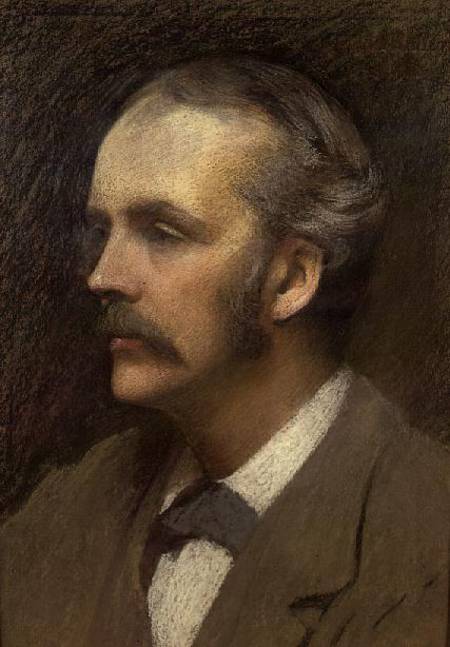Arthur James Balfour frases e citações
Arthur James Balfour: Frases em inglês
Speech to the University of Edinburgh (26 January 1927), quoted in The Times (27 January 1927), p. 14
Lord President of the Council
“Fairly well, but it is like talking to a lot of tombstones.”
Answer to Lord Riddell after he asked him how he liked speaking in the House of Lords (19 July 1922), quoted in Lord Riddell's Intimate Diary Of The Peace Conference And After 1918–1923 (London: Victor Gollancz, 1933), p. 379
Lord President of the Council
Speech to a lunch of the English-Speaking Union in the Criterion Restaurant (11 October 1918) after the sinking of the RMS Leinster, quoted in The Times (12 October 1918), p. 2
Foreign Secretary
Memorandum, 'The Peace Settlement in Europe' (November 1916), quoted in Blanche E. C. Dugdale, Arthur James Balfour, First Earl of Balfour, K.G., O.M., F.R.S., Etc. 1906–1930 (London: Hutchinson & Co. Ltd, 1936), p. 325
First Lord of the Admiralty
Memorandum, 'The Peace Settlement in Europe' (November 1916), quoted in Blanche E. C. Dugdale, Arthur James Balfour, First Earl of Balfour, K.G., O.M., F.R.S., Etc. 1906–1930 (London: Hutchinson & Co. Ltd, 1936), p. 324
First Lord of the Admiralty
Leader of the Opposition
Fonte: Speech to the executive committee of the City of London Conservative Association announcing his resignation as party leader (8 November 1911), quoted in The Times (9 November 1911), p. 10
Letter to Lord Newton (25 July 1911), quoted in The Times (26 July 1911), p. 8
Leader of the Opposition
Speech in the Albert Hall, London (29 November 1910), quoted in The Times (30 November 1910), p. 9
Leader of the Opposition
“I cannot become another Sir Robert Peel in my Party.”
Remark to David Lloyd George (October 1910) rejecting his proposals for a coalition government, quoted in Blanche E. C. Dugdale, Arthur James Balfour, First Earl of Balfour, K.G., O.M., F.R.S., Etc. 1906–1930 (London: Hutchinson & Co. Ltd, 1936), p. 54
Leader of the Opposition
Cheers.
Speech in Hanley (4 January 1910), quoted in The Times (5 January 1910), p. 7
Leader of the Opposition
Cheers.
Speech in Hanley (4 January 1910), quoted in The Times (5 January 1910), p. 7
Leader of the Opposition
Letter to Joseph Chamberlain (14 February 1906), quoted in The Times (15 February 1906), p. 9
Leader of the Opposition
Speech https://api.parliament.uk/historic-hansard/commons/1901/jan/25/address-in-reply-to-the-kings-message#column_20 in the House of Commons (25 January 1901)
Leader of the House of Commons
Speech https://api.parliament.uk/historic-hansard/commons/1887/mar/28/motion-for-leave-first-reading#column_1656 in the House of Commons (28 March 1887) introducing the Irish Crimes Bill
Chief Secretary for Ireland
Election address for the 1885 general election, quoted in Blanche E. C. Dugdale, Arthur James Balfour, First Earl of Balfour, K.G., O.M., F.R.S., Etc. 1848–1905 (London: Hutchinson & Co. Ltd, 1936), p. 72
President of the Local Government Board
Election address for the 1885 general election, quoted in Blanche E. C. Dugdale, Arthur James Balfour, First Earl of Balfour, K.G., O.M., F.R.S., Etc. 1848–1905 (London: Hutchinson & Co. Ltd, 1936), p. 72
President of the Local Government Board
Speech https://api.parliament.uk/historic-hansard/commons/1882/may/16/ireland-irish-policy-of-the-government#column_836 in the House of Commons (16 May 1882) denouncing the Kilmainham Treaty
Backbench MP
Chief Secretary for Ireland
Fonte: Letter to Mary Gladstone Drew (17 May 1891), in Some Hawarden Letters, 1878–1913, Written to Mrs. Drew (Miss Mary Gladstone) Before and After Her Marriage, chosen and arranged by Lisle March-Phillipps and Bertram Christian (London: Nisbet & Co., 1917), p. 248.
